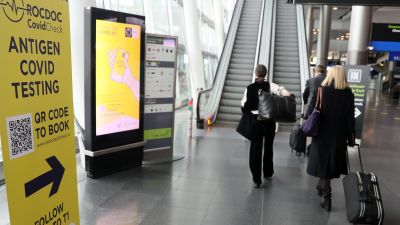Explainer
Do you need a Covid test? All the travel rules between Ireland, Northern Ireland, and rest of UK

By Louise Convery
The Republic of Ireland has brought in new Covid testing rules in the weeks before Christmas, in response to the emergence of the Omicron variant.
The new testing and vaccine status proof requirements do affect travellers travelling from Great Britain into Ireland, which is part of the Common Travel Area (CTA).
However, the Irish government's rules does not affect travel on the island of Ireland.
Travellers arriving from Northern Ireland are not affected by the Republic's new travel regime, with some limitations.
What is the Common Travel Area?
The CTA is a long-standing arrangement between the UK and Ireland, the Channel Islands and Isle of Man that allows citizens to move freely and reside in either jurisdiction.
However due to different jurisdictions setting their own Covid-19 restrictions, some travellers may be confused about where they stand when arranging trips between the Republic of Ireland, Northern Ireland, England, Wales, Scotland, the Channel Islands, and the Isle of Man.
UTV has put together a full list of the latest rules - including on masks, testing and vaccine certification - across jurisdictions, to consider when planning a flight, rail, ferry or road journey, or booking dining and entertainment with friends and family this Christmas.
What are the latest Covid travel rules within the Common Travel Area?
Northern Ireland advice:
If you are travelling from within the CTA and staying overnight in Northern Ireland, it is recommended that you should take a rapid lateral flow device test (LFD) before you begin your journey and only travel if the test is negative.
It is also recommended you take an LFD test on days two and eight of your stay.
The Northern Ireland Executive's public health advice bans travel to Northern Ireland if you have Covid symptoms, or have received a positive Covid result.
You do not need to fill in a Passenger Locator Form if you’re travelling from within the CTA and you have not been outside the CTA in the last 10 days.
If you are travelling from Northern Ireland to other regions of the CTA and staying overnight, that same advice applies.
Mandatory Covid passports are required to gain entry to venues including pubs, restaurants and cinemas.
Face coverings are mandatory on public transport, in shops, and in hospitality venues, except when seated to eat and drink.
Republic of Ireland advice:
New rules for travelling to Ireland were brought in at the start of December.
From Sunday 5 December 2021, passengers to Ireland (including Great Britain) will be asked to show a negative test for Covid-19.
if you do not have proof of vaccination or recovery, you will have to show a negative RT-PCR test which was carried out no more than 72 hours before you arrive in Ireland
if you have proof of vaccination or recovery from Covid-19, you can show a negative antigen test which was carried out no more than 48 hours before you arrive in Ireland
Alternatively, you can show a negative RT-PCR test which was carried out no more than 72 hours before you arrive
Only Rapid Antigen Tests which are listed on the common EU Rapid Antigen Test list will be accepted and it must be carried out by a health professional or skilled testing personnel – you can’t test yourself.
If you are travelling to Ireland from overseas you must fill out a Passenger Locator Form (PLF) before departure.
Some exemptions from testing requirements include:
People who are travelling in the course of their duties, an international transport worker in possession of an annex 3 certificate, a HGV driver or aviation or maritime crew
people travelling for urgent medical reasons
children aged 11 and under
passengers from Northern Ireland who have not been overseas in the 14 days prior to arrival
A Covid Pass will be required for gyms and leisure centres and hotel bars and restaurants.
Face coverings are mandatory in retail outlets, banks, credit unions and post offices, in taxis, in bus and rail stations and on public transport.
England advice:
There are no restrictions on travel into England from the rest of the Common Travel Area.
You do not need to complete a Passenger Locator Form; take any Covid-19 tests or quarantine on arrival.
Do not travel if you have Covid-19 symptoms or are self-isolating.
You must wear a face covering in shops and on public transport.
Scotland advice:
Travel is allowed between Scotland and England, Wales, Northern Ireland, the Channel Islands and the Isle of Man.
No restrictions apply except if you've been abroad in the 10 days before you arrive in Scotland.
If you are travelling to a Scottish island you are advised to take a lateral flow test before you travel to reduce the risk of coronavirus being brought into island communities.
You should test three days before you plan to travel and then again on the day of departure. If you test positive, you should complete your period of self-isolation before you begin your journey.
Everyone aged 12 and over must wear a face covering, unless exempt, in most indoor public spaces.
Wales advice:
Travel to Wales from within the Common Travel area is not counted as international travel so you do not need to test, isolate, or fill in a Passenger Locator Form as long as you have not travelled abroad in the 10 days before you arrive.
Face coverings must be worn in all indoor public places, and public transport, including taxis. You do not have to wear face coverings in places where food and drink is served, such as pubs, cafes and restaurants.
Some hospitality venues might ask you to wear a face covering. They can do this because they have looked at how to manage the risks for their business.